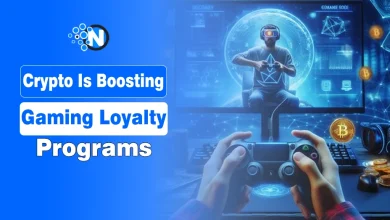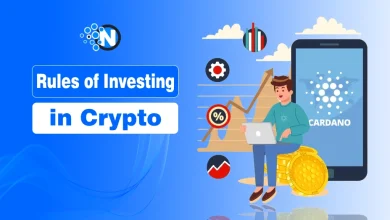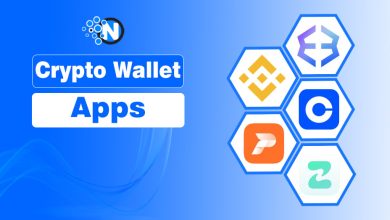NFT Marketplace App Development Guide for 2025

As the digital economy evolves, NFT marketplaces have emerged as a game-changing platform for buying, selling, and trading different digital assets. These marketplaces operate on blockchain technology, ensuring secure transactions, transparency, and true ownership of NFTs. Developing an NFT marketplace app could be a lucrative initiative in this digital sphere.
Are you planning to develop an NFT marketplace app? I have got you covered!
In this guide, I will cover everything you need to know about NFT marketplace app development, from understanding key features to the development process.
Let’s start!
Understanding NFT Marketplace App Development
An NFT marketplace app enables users to buy, sell, and trade non-fungible tokens (NFTs) and NFT tokens after they undergo NFT minting. The blockchain technology stores these exclusive digital assets to guarantee their authentic value and certifiable ownership. The growing NFT market presents tremendous possibilities because analysts anticipate it will expand by 30.28% annually from 2024 to 2028.

Services on NFT platforms and NFT management solutions for NFT owners present an ideal opportunity to develop your NFT creation project. To understand this marketplace better, you should examine its developing features. Both businesses and creators now actively pursue NFT marketplace development services for their market entry into the evolving industry.
The NFT digital domain expands beyond artwork trading to include various digital products such as music and virtual land ownership, together with the development of virtual domains. The NFT environment is growing to introduce new market segments that drive NFT marketplace development into an exciting evolution of the NFT industry and NFT realm operations.
Key Features of a Successful NFT Marketplace App
To build a thriving NFT marketplace app, it is essential to embed pivotal cutting-edge features that improve both user-friendliness and the efficiency of operations. These integral elements include:
- Efficient payment processing systems
- Integration with digital wallets
- Auction capabilities for buying and selling
- Advanced search functions
- User ratings mechanisms
- Indicators for listing statuses
These components are crafted to streamline the user experience while facilitating effortless transactions within the platform.
Delving into some of these indispensable features reveals why they are crucial in distinguishing an NFT marketplace app.

User Interface and Experience
A successful NFT marketplace should integrate a smooth-operating platform with an easy-to-use interface, ensuring seamless transactions for its users. The significance of a user-friendly design in the interface is paramount as it boosts ease of navigation and overall contentment among customers, essential factors for customer retention within a user friendly marketplace. With such an intuitive interface, users can navigate effortlessly across different NFT categories, which bolsters engagement and encourages them to return.
Employing animations alongside real-time updates significantly heightens interaction with users while keeping them well-informed about any changes or new information. Giving priority to the user experience during development guarantees that the application is not only straightforward but also aesthetically pleasing. Choosing an appropriate technology stack reinforces important aspects like functionality and potential growth capability of the platform.
Smart Contracts
The security foundation of NFT transactions depends heavily on smart contracts while they actively increase transparency within these transactions. The coded terms of self-executing contracts within smart contracts establish both transparent transaction clarity and secure verification for rights transfer and owner verification.
People trust smart contracts more when developers use secure programming languages to create them because this action reduces their potential vulnerabilities. Smart contracts provide both security features along with transparency capabilities that boost assurance levels among NFT users during marketplace transactions.
Digital Wallet Integration
The main storage facility for users’ non-fungible tokens within NFT marketplace apps is the digital wallet which stands essential for platform functionality. The built-in storage system eliminates the need for external platforms, ensuring safe NFT management and improving overall application consistency.
Users experience enhanced convenience in NFT transactions because digital wallets let them conduct purchase and disposal and exchange operations seamlessly. Such deep integration offers robust security for users’ assets while simultaneously enhancing the ease-of-use and efficiency of the marketplace application.
Steps to Develop an NFT Marketplace App
Creating an NFT marketplace app encompasses a series of meticulous steps, which include conducting thorough market research, choosing the appropriate blockchain technology, and crafting the design of the application. These stages are crucial for making sure that your NFT marketplace caters effectively to user requirements and distinguishes itself within a competitive landscape during its development.
To construct an NFT marketplace successfully, one must adhere to a methodical approach that spans from early planning through deployment and onward into marketing efforts. This provides an in-depth examination of the nft marketplace development process essential for building a resilient and prosperous platform.
1. Market Research and Planning
Conducting market research is crucial for understanding user needs and pinpointing areas where current NFT marketplaces may be falling short. By doing this, you can customize your platform to cater to precise business needs and address particular market necessities.
Monitoring the prevailing trends within the NFT marketplace sector and adapting your approach in response is key to maintaining relevance and competitiveness. Establishing a well-thought-out business model and clearly specifying necessary criteria provides a robust base for the development process.
2. Choosing the Right Blockchain Platform
Your NFT marketplace needs a properly selected blockchain network to ensure sustainability and security since blockchain selection affects marketplace expansion opportunities. To ensure success, your project needs all transaction speed requirements, along with fee levels and security standards to converge.
The NFT marketplace industry relies on three key blockchain technologies: Ethereum, Binance Smart Chain, and Flow. Your NFT application will rely on these distinct blockchain features for achieving successful operation and triumph.
3. Designing and Developing the App
An NFT marketplace’s success depends heavily on selecting the right technology stack, as this determines how well it functions and remains secure while handling increasing user demands. To accommodate every required functionality one should select a tech stack during product development.
The main characteristics of NFT marketplaces include functions to post items, auction systems, and digital wallet connectivity. Smart contracts play an essential role in marketplace automation for NFT purchases or sales because they enhance security and transparency.
Custom NFT Marketplace Development Services
Business demands form the basis for custom NFT marketplace development because this approach leads to increased user engagement as well as higher satisfaction rates. Unique features and specific functionalities would attract an audience focused on this particular product type. The technical expertise of skilled NFT platform developers enables them to build unique NFT marketplaces and white-label NFT marketplaces, achieving this goal. NFT marketplace development enables businesses to establish an essential strategic position in the highly competitive market.
Choosing bespoke NFT development services enables more seamless integration with specific blockchain technologies that align perfectly with particular business needs. Seeking out companies that provide customizable and scalable innovative solutions for NFT development ensures your platform remains agile enough to adapt to shifts in the marketplace when collaborating closely with experienced NFT developers.
Cost Factors in NFT Marketplace App Development
The cost to develop an NFT marketplace typically ranges from $50,000 to as much as $200,000. This variation in the NFT marketplace development cost is attributed to the complexity of the project and the technological preferences employed. The intended features and functionality of the marketplace play a crucial role in determining this cost.
Factors like design intricacy, particularly when incorporating a responsive user interface (UI), can influence total expenditure on market development. Costs are impacted by team composition—larger teams with seasoned experts tend to have higher wage demands. It’s important not just to account for initial costs but also ongoing expenses such as maintenance and adherence to legal standards within your budget for software development process planning.
Ensuring Security in NFT Marketplace Apps

Integrating a digital wallet is essential for the safekeeping and handling of NFTs and cryptocurrencies, which are forms of digital assets. The addition of two-factor authentication (2FA) drastically diminishes the likelihood that these assets will be accessed without authorization.
The creation of a custom NFT marketplace bolsters security through the adoption of bespoke security measures tailored to combat particular weaknesses. It’s essential to keep all software and tools up to date with the most recent versions to protect against known threats effectively. A dependable development firm ought to prioritize robust strategies concerning security and adherence to regulations, as these elements are vital in safeguarding both user data and digital assets.
Marketing Your NFT Marketplace App
Crafting a narrative for your NFT project and incorporating polished design elements can make a lasting impression on prospective buyers. Partnering with prominent personalities within the NFT arena can greatly amplify your visibility and establish trust.
Cultivating an engaged community specific to your NFT project improves interaction and enables direct dialogue with the people you want to reach. Implementing public relations campaigns enhances your project’s standing and attracts interest from the press, which is crucial for gaining the confidence of investors in digital communities.
Choosing the Right NFT Marketplace Development Company
The selection of a partner for NFT marketplace development requires evaluating their ability to work with blockchain and NFT technologies, as these fundamentals will determine the success of your project. The combination of portfolio reviews and case study analysis demonstrates both creative ability and successful project completion during their previous work.
The reliability and quality of services of an NFT marketplace development company can be determined by reviewing both client feedback and customer testimonials. Success in your NFT marketplace project heavily depends on selecting a suitable NFT marketplace development company.
Final Words
Developing an NFT marketplace app requires careful planning, technical expertise, and a solid understanding of blockchain technology. From defining your app’s features and choosing the right blockchain network to ensuring security measures and creating a user-friendly experience, each step plays a vital role in building a successful platform.
As the NFT space continues to grow, staying ahead of trends and offering innovative solutions can make your marketplace stand out. By following best practices and adapting to market changes, your NFT marketplace app can thrive in the evolving world of digital ownership and blockchain commerce.



